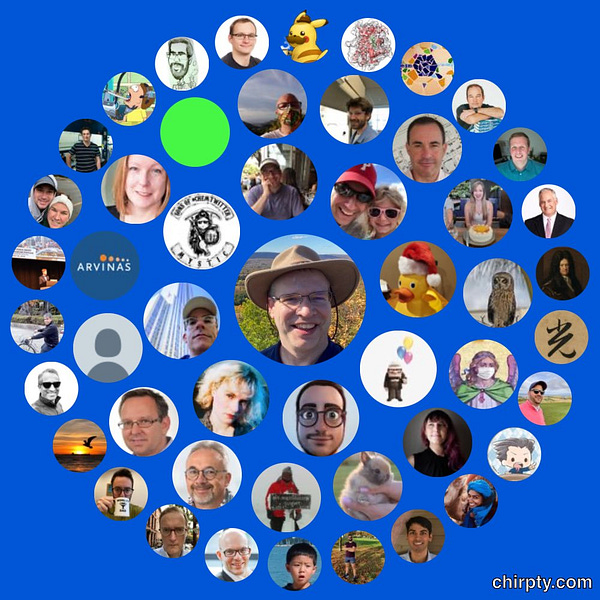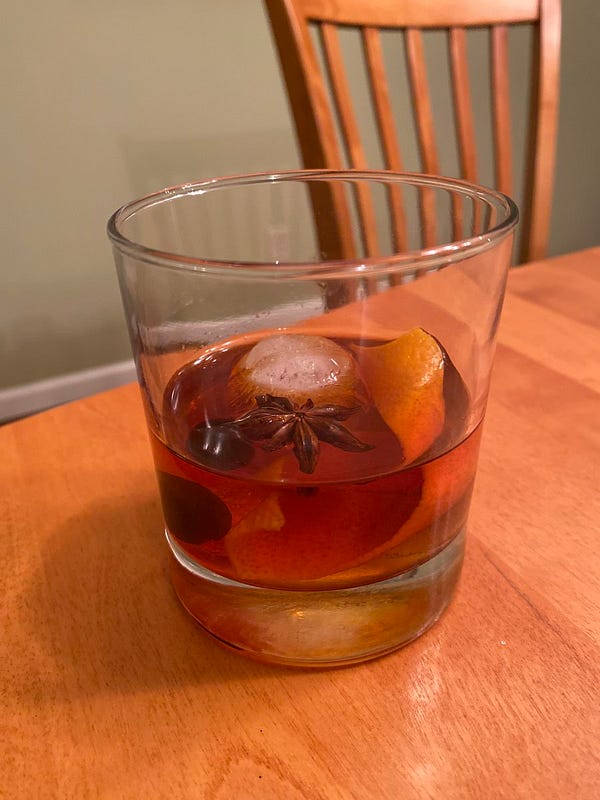Ramblings: January 2022
1 February 2022
Here are some collected Twitter ramblings from January 2022.
Clear SAR may be the biggest ask here. I think most of us are really happy to have 2021 in the rear-view, as we creep toward the third year of the global COVID-19 pandemic. I made the best of 2021 that I could, and it was a fertile and productive time at work. Still happy for it to be 2022.
All my favorite Twitter people. Wonder how it will look next year!


Maybe it’s the New Year’s Resolution phenomenon, but I found myself in a pedagogical mood this month, especially re: bridging the academia/industry divide. There is just so, so much stuff that academia obscures from people about life and careers outside their immediate sphere. I attach no judgment to the word “obscures” either. Some of it is deliberate, coming from elitist, narrow-minded PIs who consider their careers to be “peak scientist”, and anything outside academia is for lesser humans. But I think a larger part of it is simply that PIs have never worked in any other walk of life, and therefore lack the basis to share that information with their students. One of the great strengths of Twitter is its ability to be the bridge between worlds. It allows people like me who have been in industry for a long time to speak directly to people who are still contemplating what to do with their careers, and lack the comparisons to “not academia”.

I missed my chance to be an engineer. I’d be really terrible at it, but I’ve had a lifelong fascination with spaceflight. Have played some Kerbal Space Program with the kids too, so I now have learned (in my 40s, no less!) just enough orbital mechanics to be dangerous. Or at least to understand (roughly) what’s going on during a launch.


Several posts this month about AI/ML and my general skepticism. I hope we can get to some sort of uneasy alliance with the Silicon Valley tech bros, but that has to begin with a healthy dose of humility on their part. The tech set have consistently underestimated how hard drug discovery really is. They’re in my backyard now. I’m not telling them to get off my lawn, but I am telling them to respect the rules of the house. Aled Edwards had a real crusher of a thread this month that I thought was right on point (vide infra).


File this under my general disdain for folks who reveal their ignorance of drug development by referring to manufacturing processes as “recipes”. Making metric tons of a new drug is not even remotely the same thing as going to the market, picking up a few things, and baking a cake. It’s a terrible analogy, because it gives people a false sense of the degree of difficulty.
It was a cocktail mood this month. Star anise is not a traditional Old Fashioned ingredient, but I make no apologies. It’s a delightful addition of spice that I encourage everyone to try!

Yeah, January is also this time of year. Performance review time. Filling out these documents is just the pits. And it’s also not real performance management; it’s only the formal documentation of the real process. That happens in the ebb and flow of the regular conversations everyone should have with their reports. I always tell my folks, you should never be surprised by a performance review. You should have a good sense of where we stand with each other, and objectively what kind of year you had. If you don’t feel that way, we’re not talking enough.
Did I mention a cocktail theme this month?
Vide supra.

Yeah. There’s some places where AI can be impactful in drug discovery, in specific applications like ligand discovery. However, this is not the rate-determining step in drug discovery overall. Long and expensive clinical trial failures are why this business is so difficult and humbling. If AI can fix that problem, then it will be a game-changer. But that reality is unlikely to happen in my lifetime.


And a bit more on the AI theme. Much is made about how AlphaFold has had so much success in modeling protein structures. And that is indeed a useful thing. But that success is built on the back of the PDB: an enormous, decades-long, extensively curated, high quality set of protein structures. It dodges the garbage in, garbage out problem. Pretty much every other facet of drug discovery has no data set of comparable size and quality to train a model on.


I miss Gilbert Stork. He was such a great guy. It was my privilege to rub shoulders with him in even the smallest ways for five years at Columbia. I have half a dozen other good Stork Stories that I’ll roll out someday. Probably starting with the time the EPA paid a visit to the department and had a reaction of their own to Stork’s chemical stockroom.


I love the simplifying nature of “med chem in one graph”. It’s not really quite that simple, of course, but as a first approximation, and a teaching tool, I still like it. Mostly because it reminds us of our generation-long over-reliance on potency optimization at the expense of pharmacokinetics.

This wonderful scientist, who taught me one of the most powerful manager lessons there is (I don’t have to be like you/you don’t have to be like me), shall remain nameless. I’ll remember this moment forever.



There’s those cocktails again! Seriously though, scientists (me included) are whole people. I have likes and interests and friends and family and other things that aren’t just my day job. It’s my Twitter account, and I’m going to post on those other things sometimes. I think one of the principal reasons that social media can (ironically) become so dehumanizing is that we start seeing people as just the words they post. Posts like this are a gentle reminder that a human being is behind all of those words. And also that I like to drink cocktails.


This one, oy. The values of academia are a value system. They are also the first value system that most scientists are exposed to as a way to think about their work, their relationship with it, and their relationships with others. We all generally have to pass through school of some kind en route to our eventual scientific careers. Unfortunately, this leaves many people with the impression that this value system is the only one there is. Through ignorance or neglect or malice (or some combination of these), academia often fails to mention that there are other value systems in which to do science. In industry, we share parts of that value system, starting with a basic commitment to scientific integrity. But there are other parts, like the importance of publications, awards, sole dedication to the work at the expense of everything else, and maintenance of good management and leadership skills, where industry is wildly divergent from academia. Someone needs to say this out loud, and reach the souls in academia who want out and don’t realize that it can be different. So I am.


Yeah, so this one is an extension of what I was talking about in the previous post. Another part of the academic value system seems to be that they think they’re the best scientists around. And if you judge by the value system of academia (how convenient, that), then they probably are.
People have convinced themselves, maybe because it’s the only thing they’ve ever heard, that a tenure track faculty job is the best job a scientist can have, and any other job is for those who can’t cut it in some way. But… those positions are limited in supply, not because of their prestige, but rather because of basic labor market economics. Our society decides, via supply of funding, that we need x number of people in academia in PI roles, and the number already there is very close to x. So folks bend over backwards to try and get those positions, stay in a system that many of them have figured out they don’t even like, often doing many years of post-doc and staff scientist work for shit pay and benefits, just because they seem to think this is the only job worth having.
This is unequivocally false. Once you open yourself to different scientific value systems besides the academic one, it becomes easier to see that there’s abundant room for talented people in other walks of scientific life such as industry. If you haven’t noticed recently, particularly in the pharma sector, the sector is flush with money and hiring is red hot. We can’t hire people fast enough.
So then we look across the way and see all of these people in academia giving up what may be some of the best and most productive years of their lives trying to get a job that’s in very short supply. Hello! We’re right over here, and we’d like to talk to you about a job. We’ll generally pay you better and treat you like a human being too.


Octavia Butler is just the best. This creeped me the hell out.


ChemTwitter did indeed rise to the challenge, although I doubt the “laws” we came up with were exactly what @LiveScience probably had in mind.
At least the CDC finally got some heat taken off of it.
Yeah, it’s ubiquitination. Twitter has decided.


I tell my kids this too. Whether it’s because the person being interviewed doesn’t want to answer the question that was asked, is unable to, or just wasn’t listening: please, always try to answer the question you were asked first. I cannot overstate how poor a look it is when people head straight to the pivot, sometimes repeatedly.
I hope this doesn’t mean I’ve hit the high water mark of my year in January.
Five years on Twitter, and every day I’m surprised by and thankful for how many people have tuned in to listen to whatever I’m rambling about on a given day. Thanks for coming along for the ride, Twitter fam.


I ordered my kids a fresh copy of Maus to read right after this, because fuck censorship.

Hit on this one in the ramble above. But it really is this simple. Don’t let anyone in that prestige-driven bubble tell you otherwise.



The various SARS-CoV-2 drug discovery efforts in industry have to be viewed as one of the most clutch drug discovery efforts of all time. Shionogi is coming along. And the Pfizer team fired on all cylinders, and they should be very proud for coming through.









